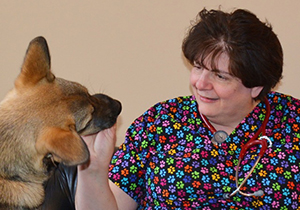
Photo by Dr. Chiara Switzer
Dr. Chiara Switzer offers treats to her dog, Lily. The veterinarian considers herself Lily’s guardian, not her mom.
I recently went looking for a day care for my new pup, who has more energy than I do and needs some socialization. I visited three places, filling out applications at each. One asked for my name in a spot specified for “owner.” Another used the term “guardian.” The third used the term “pet parent.”
When I mentioned to the staff member that I wasn’t Lily’s parent, she admitted that while some people love the term, others hate it.
Count me among them.
As a clinical small animal veterinarian, I try to respect all variations of relationships people have with their dogs and cats.
Different people can have very different relationships with the dogs and cats in their lives (with other animals, too, but I’ll stick to dogs and cats here). Some consider them family members, sometimes akin to — or substitutes for — children. Others regard them as beloved pets that are less than family but more like really good friends who are invited to share the home for a dozen years or more.
Some people consider their dogs or cats as friends with separate housing (kennels, dog houses, barns), but who come over to play and for whom they provide food and support. And to some people, they are more like employees, with a job or jobs to do — employees one wants to treat well and maintain in good mental and physical health, but with whom one has a more distant, if pleasant, relationship.
All these relationships are variations of normal, and that can be a hard truth. Members of one group often don’t understand how members of another group can think of, let alone treat, their dog or cat that way.
The terms “pet parent” and “fur baby” that are so in vogue these days bring the division to the fore. Some people love the terms, referring to themselves as the mom or dad of their pet and rejecting the concept of being owners or even caregivers of their beloved animals.
Other people find the term offensive because of its implication that animals would have equal status to human beings, or the suggestion that they are unemotional if they don’t consider their dog or cat to be like their child. The division can intensify if one side tries to impose its philosophy on the other; for example, if people who consider their pets as children criticize as uncaring those who don’t treat their animals as family.
For my part, as long as an animal is well-treated (housed comfortably, fed appropriately, preventative and acute health issues dealt with) and the person takes the responsibility seriously, I’m satisfied — whether my client considers that dog a child substitute, a shop employee who greets customers and keeps vermin at bay, or anything in between.
I try to maintain as neutral and benign an attitude as possible about a client’s relationship with my patient, so as not to put off anyone. I try to help them maintain the relationship in health and happiness, regardless of what it is.
But honestly, I hate the terms “pet parent” and “fur baby.”
In online conversations with other veterinarians, I’ve seen a pretty wide, although hardly universal, dislike of the term “pet parent.” Why? Maybe because it excludes all those other relationships that we see with clients. Maybe because we’ve seen some of the potential negative effects of anthropomorphizing pets and having an overprotective relationship with one’s pets, including fearful behaviours and obesity.
There’s also something that strikes me as rather manipulative about it — when someone tells me that I became a “pet parent” when I got my puppy, it seems to me as if they are trying to define the relationship they think I should have with my dog, rather than the relationship I want to have with my dog (let alone the relationship my dog will choose to have with me, which unfortunately doesn’t always match our plans).
I always wonder if a company that terms those with pets as “pet parents” is trying to tug on maternal or paternal heartstrings in an attempt to emotionally manipulate someone into buying, feeding, or using more, as if material things are a way to show children love. And, let’s face it, for some people, it is.
I also wonder if those who call themselves “pet parents” are just using a trendy term, or whether they truly have the same relationship with their pet as they do (or did, or will) with their children. Or do they imagine that’s the relationship they would have had with their children, had they had any? I hope not — I think it does a disservice to animals to treat them like children, and it does a disservice to children to treat them like pets.
Personally, I like the term “guardian.” It implies looking after something living and sentient, specifying my responsibility without specifying an emotional relationship. I do know that I’m not my pet's parent, even though I care for my pup and want to help her to grow up well, happy and safe. My relationship with my pet might change as we each age and grow, but she’ll never be my fur baby and I’ll never be her mom.
Chiara Switzer graduated from the Ontario Veterinary College at the University of Guelph in 2000. She began doing small animal relief work more than 13 years ago after deciding she wanted more variety and challenges in her professional life. Prior to returning to school to pursue her veterinary degree, she worked in the television industry doing statistical and production work for nearly 10 years. Switzer lives in Toronto but her relief work allows her to take her dog and hit the road to work in a variety of cities and towns across Ontario.